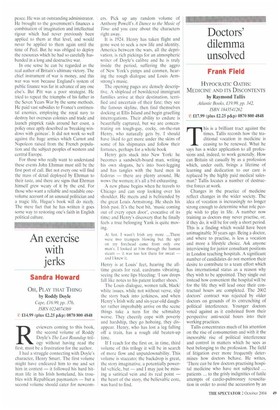An exercise with jerks
Sandra Howard
OH, PLAY THAT THING by Roddy Doyle Cape, £16.99, pp. 376, ISBN 0224074369 it £14.99 (plus £2.25 p&p) 0870 800 4848 Reviewers coming to this book, the second volume of Roddy Doyle's The Last Roundup trilogy without having read the tir,,A, mu,,i be a frustration for the author.
I had a struggle connecting with Doyle's character, Henry Smart. The first volume might have endeared him to me and set him in context — it followed his hard hitman life in his Irish homeland, his troubles with Republican paymasters — but a second volume should cater for newcom
ers. Pick up any random volume of Anthony Powell's A Dance to the Music of Time and you care about the characters right away.
It is 1924. Henry has taken flight and gone west to seek a new life and identity. America between the wars, all the deprivation, is rich pickings for an atmospheric writer of Doyle's calibre and he is truly inside the period, suffering the aggro of New York's pimps and conmen, hearing the rough dialogue and Louis Armstrong's music.
The opening pages are densely descriptive. A shipload of bewildered immigrant families arrive at their destination, terrified and uncertain of their fate; they see the famous skyline, then find themselves docking at Ellis Island and begin gruelling interrogations. Their ability to endure is beautifully captured, but we are concentrating on tough-guy, cocky, on-the-run Henry, who naturally gets by. I should have liked to get more under the skins of some of his shipmates and follow their fortunes, perhaps for a whole book Henry gets stuck into New York: he becomes a sandwich-board man, writing his own slogans, he's into boot-legging and has tangles with the hard men in fedoras — there are plenty around. He wows the women; it's all a bit exhausting.
A new phase begins when he travels to Chicago and can stop looking over his shoulder. He meets and is befriended by the great Louis Armstrong. He sheds his Irish past. It's the best bit, 'music coming out of every open door', evocative of its time; and Henry's discovery that he finally feels a true belonging Yank is quite moving.
At last. I wasn't Irish any more ....There were two trumpets blowing but the spit on my forehead came from only one man's. I looked at him through the human steam — it was too hot there for sweat — and I knew it.
Henry is at Louis' feet, hearing the alltime greats for real, eardrums vibrating, seeing the sore lips bleeding: 'I saw drops tali like notes to his patent leather shoes.'
The Louis dialogue, women talk, black/ white issues, while not without verve, slip the story back into jerkiness, and when Henry's Irish wife and six-year-old daughter rather improbably arrive on the scene things take a turn for the schmaltzy worse. They cheerily cope with poverty and hardship, they go hoboing, they disappear. Henry, who has lost a leg falling off a train, has a rough old beaten-up time.
If I reach for the first or, in time, third volume of this trilogy it will be in search of more flow and unputdownability. This volume is staccato; the backdrop is great, the story imaginative, a potentially power ful vehicle, but and I may just be missing a satirical vein and its real point — the heart of the story, the believable core, was hard to find.


















































































 Previous page
Previous page